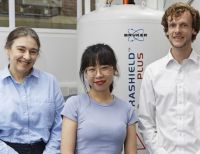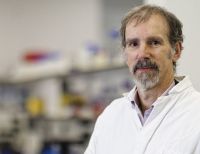The course was intense and inspirational. I think everybody on it has ended up doing something dramatically different. It opened us all up to a new world of possibilities.
Did you come away with a fully-formed idea for a business? No, but some seeds were definitely sown. I spent a year asking anyone and everyone what problems they saw in healthcare. That included my partner, oncologist, Dr Saif Ahmad (and co-founder and Chief Scientific and Medical Officer of 52North).
One day, he turned around and said: "You know, there's this awful thing for chemotherapy patients which badly affects the quality of their life and is a huge issue."
When he told me about it, it seemed like a problem we might be able to solve.
What is the issue? Chemotherapy suppresses your immune system which means you have both a much greater risk of developing an infection and an impaired ability to fight that infection. This can lead to a condition called neutropenic sepsis, which can be fatal.
When you are being treated with chemotherapy you are advised that if you get a fever or feel 'generally unwell', you must head straight to A&E.
This can be both difficult and stressful. Not everyone has access to transport and it's not always easy to drop everything, particularly if you are looking after children, or have other caring responsibilities or work on a contract that doesn't give you paid sick leave.
Around half of patients, having rushed in to have full set of bloods taken, are fine and are sent home after a couple of hours.
However, those that aren't fine need to be given antibiotics really quickly: every hour’s delay increases the risk of death by about 8%. The guidance both in the US and the UK is that they should have antibiotics within one hour of the onset of symptoms.
But many of the patients who need them don't get their antibiotics within that first hour. One of the main reasons is that people delay calling in. They think: "I'm probably fine, I'll see if it gets worse, then I'll call."
As well as being a problem for patients, the current system is also a resourcing issue for hospitals. Trying to get people seen and tested within an hour also places a significant burden on an overstretched healthcare system.
How did you start to turn this challenge into a business? Having done the MPhil, I had the skillset to start thinking about how we could solve the problem, what it might look like as a business and what resources would we need to make it happen.
But it was only when we entered the Chris Abell Postdoc Business Plan Competition run by Cambridge Enterprise, that it began to feel properly do-able. Prior to that it had been more like an interesting project but when you enter the competition you spend a lot of time developing the business plan in a structured way and you work with a mentor.
We ended up winning £10,000 and didn't even have a business bank account to put it in. But after a few months we used that initial funding to develop a high level proof of concept.
The competition was a game-changer. It also spurred us on to apply to others, such as Pembroke College’s Parmee Prize, which also proved pivotal, through our meeting with its sponsor and successful entrepreneur, Richard Parmee.
Even though we didn’t win the prize, he turned out to be a very influential supporter. I'll never forget the moment we first met him. We had presented our idea and he was sitting at the back of the room and as we were walking out he said: "This is a really important thing you are trying to do. If you ever need help, just ask."














